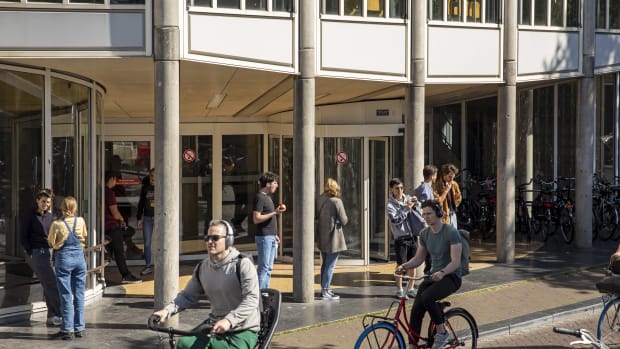
Humanities invests in new study programmes despite cuts
The announced cuts in higher education are hitting language and cultural studies at humanities faculties in the Netherlands extra hard. Utrecht and Leiden already announced cutting bachelors. What can we expect at the UvA? “A violent storm is raging, but fortunately we have a boat.”
In recent months, the announced cuts in higher education caused considerable unrest among humanities faculties in the Netherlands. In Leiden and Utrecht, the faculty boards had already decided to scrap or merge language bachelors. These plans had been in place for some time, but the cutbacks were the straw that broke the camel’s back.
At the UvA, too, this news is causing questions and uncertainties, admits Jan Rock, programme director of literature and linguistics. Since October, he has been leading a task force to map out what a renewed language and cultural studies programme at the UvA should look like. “At the same time, within the faculty we have been working for a year already on the future of the language and culture studies and there is also a plan for renewal. We continue to invest in a future plan for languagestudies even in times of austerity.”

Courage
That language and culture studies are in need of renewal has been clear for some time. For years there have been too few diploma students, students who also graduate from the programme, while many courses are packed with students from other studies taking electives. Investments by the previous government in the form of the sector plans addressed this with the objective of linking expertise in language and culture to other areas of expertise within the university. Meanwhile, that premise has become the basis for the new language and cultural studies programme at the UvA.
That plan is going ahead, despite the cuts. “By doing so, we show that things can be done differently,” says Rock. “Instead of the short-term plan to cut bachelors, the faculty board is investing in a substantive future plan for the programme, which should anchore the experise in languages and culture sustainably and widely. That takes courage, because it results in a more difficult conversation, but it is the better approach as far as I am concerned.”
More diploma students
In concrete terms, it means that language and culture studies will work more closely with other studies at the UvA. To this end, the task force will first investigate which combinations between languages and research areas make sense. Rock: “Suppose you want to do research into the history of conflicts in the world. Then it would be useful at this time to study Arabic or Hebrew. But it would also be interesting to study German if you want to involve the political philosophy of the conflict after World War II. So then we link those three languages to that field of study. In other words, the reason why you want to study a language should guide the design of the programme.”
The ambition is to make the programme more stimulating and challenging for those students, and thus to attract more degree students. We aim to appeal to students often dormant linguistic interests. Not with another promotional campaign, with slogans like ‘language is also sexy’ or ‘pretty cool’, but with a substantively strong programme. We want to position language more clearly as a separate, academic discipline that plays a role in all the major issues of our time - from climate change to the Israel-Palestine conflict.”
There is no doubt that this does preserve expertise in the specific languages and that students can continue to choose them at some point. Rock: “We are not moving towards a generic term such as Western and non-Western language and culture, I think that has no future.”
Boat
For now, nothing will change for sitting students, or students and high school students considering studying a language. Only in the academic year 2025-2026 will it become clear exactly what the programme will look like and recruitment will start at the earliest.
Provided the FGw manages to keep investing in a new course. After all, by 2025 the faculty does face a budget deficit of 5.5 million. Rock: “Cuts will have to be made, but how exactly is not yet clear. But on that raging sea of cuts, at least we have this boat, which is going to take us to a strong, substantive programme. Innovation ultimately remains necessary even apart from austerity.”

